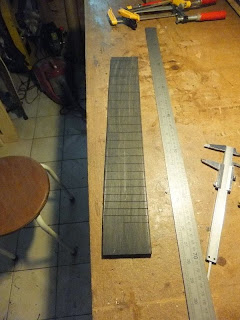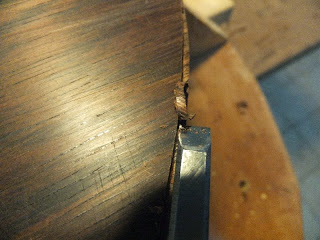Welcome to my guitar building blog.
This blog describes my journey into the world of guitar building.
I like to share my experience of building and hopefully it can be of some help to all the guitar making enthusiast.
Hope you enjoy my blog post!
2014-08-28
Preparing the fingerboard
20140821
I also prepared the fingerboard.
I marked the center line and measured the correct width and saw almost to size
After that I plane the fingerboard until the line.
Following that I marked the circle from the soundhole and cut the ends to shape.
I included a 20th fret for this guitar.
The bass side was also thin to be 1mm lower than the treble side
20140825
I patch the section of the rosette channel.
I just clean up the channel and cut a spruce patch to match the channel.
After that apply glue and clamp.
When the glue dry, I will level it.
Actually it is not really necessary to patch, I know a lot of maker doesn't bother.
But I believe having a solid area underneath the the fingerboard is crucial the upper fret treble response.
So since I have already a massive neck underneath, it doesn't make sense to have it undermined by a hole weakness in the area.
20140828
I finish up the curved part of the fingerboard at the sound hole.
Mainly I trace it with white color pencil using the sound hole itself.
The fingerboard is shaped using chisel to remove the bulk of the material followed by file and finally sander drum to finish up.
Now it's ready for gluing.
Also, I planed down the rosette patch at the soundhole.
2014-07-11
Cutting the binding and purfling channel
20140422
Next I began to cut the binding and purfling channel.
This time round I decided to go fully manual cutting by scribing and chiseling.
I started with the back and all went pretty well.
Well it's actually faster than I thought.
After 1 hour of work I am 1/2 done.
The binding channel was cut to the depth of the back.
The scribing was done with reference to the sides.
I just need to increase further the depth the channel.
This time round the reference will be from the top and set to the height of the purfling.
20140504
The purfling channel is cut.
Things are slowing down as these are the intricate parts of the build.
It doesn't really help to speed things up.
This time round I am going full manual as they allow me to control the cutting precisely.
20140602
I decided to cut the channel for the back strip.
From experience it's pretty hard for a hand tool (limited by my inexperience), so I decided to use the router instead.
Luckily the width of the bit fits nicely the width of the backstrip and purfling.
So after much measurement and setting, I routed the channel.
The depth is set using the existing purfling channel edges.
The router is guided by the flexible Aluminium bar which is held in place by the cam clamps.
I also routed the end graft but it was off center with respect to the backstripg channel
Looks like I need to add somemore things to the end graft to expand it further.
20140606
I started on the top sometime earlier and continued on the top.
Also tried to fix the skew end graft slot by enlarging the channel.
But exactly how to make it into a "feature" I have not thought thru' as yet.
Anyway the front channel looks pretty good.
Hopefully no more mistakes
20140612
I decide to redo the end graft channel.
If it's just wood endgraft it would be easy to cover up but this is a marquetry inlay so it's kind of hard to cover up.
So I patch back the current channel using the side cutoff.
The pattern matches pretty well.
After which I will re-route the channel again.
Hopefully this time round I will get it perfect.
20140616
I level the patch after the glue dried.
Now it's ready for the 2nd routing.
This time round I will make sure the alignment is correct
20140618
I recut the end graft but this time round I make sure the center line is in line before I cut.
The end result is good.
20140628
I began to cut the purfling channel on the top.
Same stuff here scribe and chisel.
But it seems that it's time to sharpen my chisels a little.
They feel a little blunt.
Once this is done I should began to glue the purfling in.

Checking the fit. Looks like i need to widen a little to cater for a black purfling veneer before the marquetry purfling for better contrast.
20140711
It's been a while since I last updated the blog.
Recently have been really busy so not much time to continue on the build.
I continue to work on the bindings and purfling channel
This is a lot of work due to the elaborate purfling and binding...
Right now I am at the front purfling stage.
2014-06-27
Starting on Guitar #9
20140528
Well this guitar is to replace the #8 since the talented guitarist owner has changed his mind on having Maple back and sides.
Instead he picked one of my best Indian Rosewood back and sides: dark and straight grained Indian rosewood.
As for the top I would be probably use the same top as #8 and choose another top for the #8 (Englemann Spruce for #8).
For #8 I would be continuing the build and see who else is interested in buying if not I just save it for myself; since I have yet to own a Maple guitar.
The only thing is I need to start again for some of parts like necks top so this will delay the schedule by a bit.
Anyway here is the IRW back.
20140625
I jointed the back using my jig.
20140627
After untying the ropes from the jig, I examine the joint.
It was done nicely.
I proceed to scrape away the hide glue squeeze out which I was unable to clean off.
Because it's hard it's pretty easy to scrape them off.
20141013
The outline of the
Subscribe to:
Posts (Atom)






















































